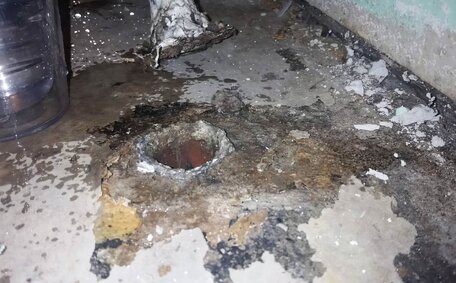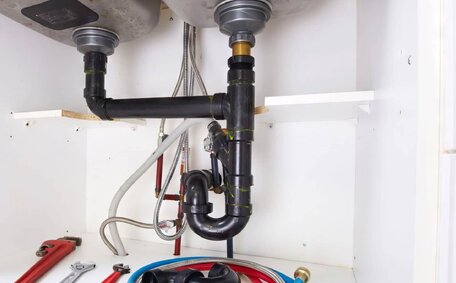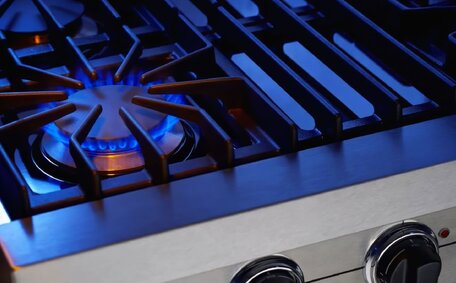Introduction to Gas Appliance Safety
Proper maintenance of water heaters and gas heaters is crucial for homeowner safety in Bankstown, Sydney. Faulty appliances that cause negative pressure may lead to gas leaks, posing serious risks of fires, explosions, and carbon monoxide poisoning.
Regular inspection and maintenance of all gas appliances are essential to prevent catastrophic incidents. This guide will show you how to check your gas appliances to identify faults early and take appropriate action.
Adhering to our gas safety guidelines will help keep your property safe and leak-free.
Recognizing Warning Signs of Gas Leaks
Prompt detection of gas leak signs is imperative to ensure safety. Here are key indicators to help you detect gas leaks in commercial properties:
Smell
Natural gas is infused with mercaptan to produce a distinctive “rotten egg” odour that aids in detecting gas leaks. If you notice this smell anywhere in or around your commercial property, it could signify a natural gas leak.
Sounds
Some other red flags include the presence of hissing whistling, or roaring sounds emanating from gas appliances, indicating possible faults. This abnormal noise, often heard in commercial kitchens, usually means there is a leak.
Visual Signs
Look out for any visible damage to gas pipes, discoloured vegetation near the gas line, or condensation on doors and windows close to appliances. Bubbles on wet pipe joints can also indicate a leak is present.
If you suspect gas leak, it’s crucial to exit the area immediately for fresh air and call a licensed gasfitter from Bankstown Plumbing professionals. We can determine the source of the issue and resolve it safely before hazards develop.
Smell of Gas
Mercaptan is added to natural gas to produce a “rotten egg” odour, aiding in leak detection as natural gas is odourless. If you notice a “rotten egg” odour in or around your home, it likely indicates a dangerous gas leak.
Detecting the odour of gas requires immediate action. Call 000 to alert emergency services if you suspect gas issues.
Exit the building for fresh air while avoiding any flames or sparks and contact your gas supplier, including avoiding use of switches/appliances. Stay outdoors until emergency crews have resolved the issue and declare the area safe.
If you suspect a gas leak after exiting, call licensed Bankstown Plumbing on 1300 349 338. Our professional can locate any gas leak source and execute necessary repairs. But safety should come first before you contact your local team or gas supplier.
Hissing or Whistling Sounds
Hissing, whistling, or roaring sounds originating from gas lines, open flued gas appliances, or pipes can signify the presence of a dangerous gas leak. These abnormal noises tend to get louder over time as the leak worsens.
If you hear any strange sounds near natural gas equipment, turn gas supply off and take urgent precautions. Evacuate everyone from the building and ensure all doors are closed, moving a safe distance away while avoiding ignition sources. Call 000 to request emergency services and notify Bankstown Plumbing on 1300 349 338 once outside.
Do not re-enter the property or attempt to locate the leak yourself; leave it to a licensed gas expert. Leave inspection and repairs to a licensed gas fitter once emergency crews give the all-clear. Technicians can pinpoint the exact location using specialist gas leak detection equipment and resolve the problem so it’s safe to turn off your gas supply back on.
Persistent and loud hissing or whistling is a clear indicator of a gas leak, demanding immediate action to prevent disasters.
Visible Signs of Damage
Visible damage to gas pipes, unflued gas lines, or appliances may indicate issues requiring immediate attention. Some key things to look out for include:
- Corrosion or dents that compromise the integrity of the heat exchanger, pipes, or joints
- Soot buildup around appliance vents
- Flames emerging from the gas burner appearing yellow/orange instead of their typical blue
- Sooting or scorch marks on appliances
- Pilot lights that frequently blow out
- Frequent activation of automatic gas shut off devices
Notify Bankstown Plumbing immediately if you notice any such visible warning signs or suspect a leak your gas appliances might have. We can inspect for dangerous gas leaks and provide necessary repairs, replacements or servicing ensure safe functioning of your gas system.
Taking Immediate Action for Suspected Gas Leaks
Noticing potential signs of a gas leak requires urgent action. Follow these steps immediately if a suspected gas leak is present:
- Evacuate everyone from the building and move to a safe location upwind, away from the site of the suspected leak.
- Avoid using any electrical devices or appliances, as sparks could ignite leaking gas.
- Call 000 to alert the fire brigade and request emergency services.
- Contact Bankstown Plumbing on 1300 349 338 to report the leak so technicians can be dispatched once emergency crews permit.
- Do not re-enter the property until emergency services declare it is safe to do so.
If you smell gas or notice any warning signs, assume there is a dangerous leak. Waste no time exiting the area and contacting the relevant authorities straight away. Addressing leaks quickly reduces the risk of fires, explosions, and carbon monoxide poisoning.
Learn how detect gas leak issues in your commercial kitchen, get more safety tips, or request leak repairs from the licensed professionals at Bankstown Plumbing, available 24/7. Reach us on 1300 349 338 or jobs@bankstownplumbingservices.com.au.
The Dangers of Gas Leaks
Gas leaks present serious dangers and should never be underestimated. Inhaling leaking gas can lead to headaches, dizziness, nausea and even loss of consciousness. The most hazardous outcome, however, is potentially fatal carbon monoxide (CO) poisoning.
Carbon monoxide, a harmful by-product released when gas doesn’t burn completely, is lighter than air and can become trapped. Being invisible and odourless, Carbon monoxide build-up can cause undetected lethal levels. It starves the body of oxygen, potentially causing brain damage and death with prolonged exposure.
Having a functioning gas detector is crucial for alerting occupants to the presence of gas and carbon monoxide before it’s too late. Locate detectors where natural gas can potentially accumulate, near all sleeping areas and on every level of the home according to manufacturer guidelines.
Yearly inspections of your space heaters and gas heating systems by qualified professionals can uncover leaks or issues before they become dangerous. If detectors sound an alarm or you suspect a leak, evacuate immediately and call 000.
Understand the hazards, ensure early detection methods are in place, and act fast at the first signs of an issue. Taking precautions could save lives or prevent property damage from fires and explosions.
The Importance of Regular Maintenance
Regular checks of your LPG gas appliances are vital for both safety and efficiency. Gas systems are complex, with each appliance containing many parts that can malfunction over time if not properly maintained.
Professionals should inspect your gas bottles and cylinders every 15 years due to their expiration date. Other gas appliances and your gas cylinder should undergo yearly tune-ups and a thorough safety check to keep them operating reliably.
Preventative maintenance, especially when you use gas cooking appliances, allows technicians to ensure minor issues are detected before they escalate. For example, loose fittings, damaged hoses and corrosion can be addressed early to prevent dangerous gas leaks. Additionally, carbon monoxide detectors, critical for detecting gas leaks, may require calibration or replacement biennially.
A qualified professional carrying out gas work ensures the safe use of specialised tools and diagnostics during scheduled servicing visits. They can uncover developing problems, adjust components that fall out of balance, and ensure safety devices are functioning as intended.
Don’t wait until you smell gas or appliances stop working. Stay vigilant with regular professional maintenance. This gives the peace of mind that your gas system will continue working efficiently and safely year after year, as demonstrated in our video.
Hiring Professional Gas Fitters
Only qualified gas fitters licensed by the Plumbers & Gasfitters Board of NSW should perform installations, maintenance and repairs of all gas appliances. Employing unqualified technicians may result in non-compliant and unsafe work, not meeting Australian standards.
As industry experts, Bankstown Plumbing employs fully certified gasfitters to service the Bankstown area. Our team holds Gas Safety Supervisor and Type A Gasfitting authorisation to legally perform this specialised trade.
Licenced gasfitters undertake extensive training and assessments to earn their credentials. This qualifies them to correctly manage gas flow in gas lines, detect leaks, provide appliance servicing, and address faults that could become blocked and guarantee safety for occupants.
Work by accredited gasfitters ensures compliance with AS/NZS 5601.1 gas installation standards. Using properly qualified specialists also gives you recourse under consumer protection laws if issues arise from faulty workmanship.
Don’t take risks with gas appliances or pipework. Hire trusted independent gasfitting professionals like Bankstown Plumbing. Our fully licenced team delivers code-compliant solutions you can rely on for safety and legal obligations.
Installing Safety Devices
Installing safety devices is crucial for detecting gas leaks and carbon monoxide exposure risks. All homes using gas appliances, like your gas stove, should be equipped with both gas detectors and carbon monoxide alarms.
Gas Detectors
Ensure gas detectors are installed in rooms with indoor gas appliances, near gas meters, and enclosed spaces like basements or sheds for home safety. Check devices monthly by pushing test buttons to ensure the audible alarm is functioning.
Carbon Monoxide Alarms
Carbon monoxide alarms must be installed according to manufacturer specifications, generally near all sleeping areas and on every level of the home. Replace batteries every 6 months and test units weekly by pressing test buttons.
Safety devices provide an extra layer of protection and help detect gas leak or carbon monoxide exposure risks early. This enables you to detect a gas leak in your vicinity, allowing quick evacuation and contacting of emergency services to resolve issues before harm occurs.
Ensuring Ongoing Gas Safety
Conduct periodic checks on all appliances for any issues with gas, lines, valves, and safety devices. Watch for leaks, damage, or abnormal operation issues. Have professionals assess gas systems annually to catch problems early. Have professionals assess gas systems annually to catch problems early. Watch for leaks, damage, or abnormal operation issues.
For assistance with system inspections or leak repairs in Bankstown, reach out to Bankstown Plumbing at 1300 349 338 or jobs@bankstownplumbingservices.com.au.






